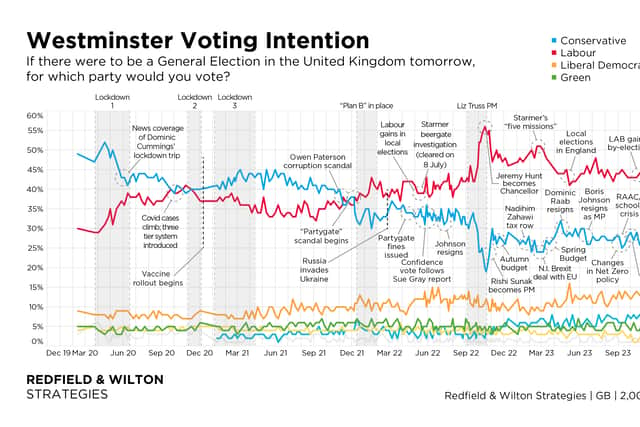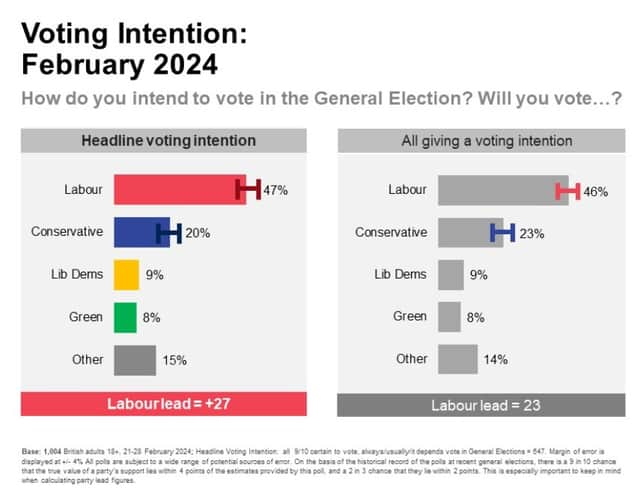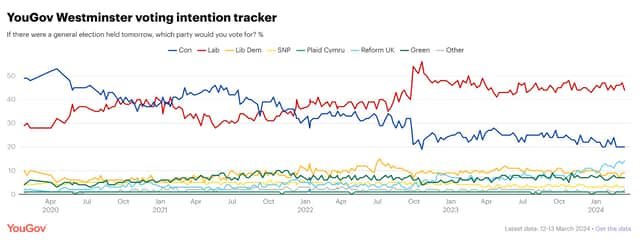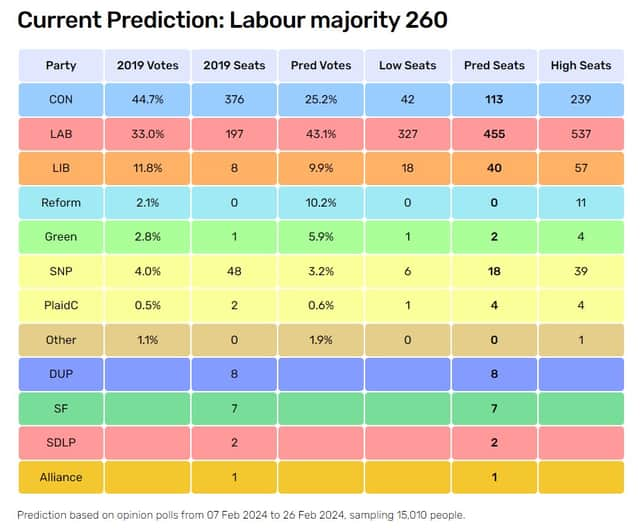UK general election polls latest: who is going to win 2024 election? Sunak hits joint-lowest rating as PM
and live on Freeview channel 276
The Conservatives have crashed to their joint-lowest poll rating with Rishi Sunak is Prime Minister, a new poll has found.
The Spring Budget does not appear to have shifted the dial, and since then the PM suffered a week from hell with Lee Anderson joining Reform UK and the scandal around Tory donor Frank Hester's racist comments.
Advertisement
Hide AdAdvertisement
Hide AdSir Keir Starmer has also faced a tricky few months with the war in Gaza causing disunity in his party and George Galloway exploiting that to win the Rochdale by-election. However, opinion polls still put his party more than 20 points ahead in the opinion polls and on track for a landslide victory.
Here we take a look at the latest opinion polls, and analyse what they could mean for the general election later this year.
Redfield & Wilton - Tories at join-lowest level while Sunak is PM
The Budget was not shifted the dial for the Conservatives at all, according to Redfield & Wilton's latest poll, with Labour's lead growing to 26 points (47%), eight points up on the previous poll. While the Conservatives vote share equals their lowest ever under Sunak on just 21%.
That's the same as the final poll while Liz Truss was Prime Minister, and its only been lower on the days around her resignation. Taking Tory voters away might be Reform UK, which is on 14% - it's joint-highest vote share by Redfield Wilton.


Ipsos - Tories at lowest level since 1978
Advertisement
Hide AdAdvertisement
Hide AdPolling company Ipsos has run its political monitor opinion poll since 1978, and the latest edition, from 21 to 28 February prior to the Budget, has the Conservatives at their lowest level over that time. Rishi Sunak’s party is on just 20%, having dropped 7 points from the previous poll.
Ipsos says previous Tory low points were 22% under John Major in December 1994 and 23%, just after Labour’s landslide win in 1997.


Labour is on 47%, having dropped 2 points, with a lead of a whopping 27 percentage points. The smaller parties - the Liberal Democrats, Green Party and Reform UK - are all hovering around 8% to 9%.
One factor that could have a big bearing on the next general election is the growing enthusiasm gap. Only 62% of Conservatives say they are certain to vote, while this rises to 76% with Labour supporters. Ipsos says this “feeds through into the headline voting figure”.
Advertisement
Hide AdAdvertisement
Hide AdWhile neither leader is particularly popular. Only 19% say they are satisfied with Rishi Sunak, while 73% say they are dissatisfied. This net rating is a record low for the Prime Minister. Starmer does not fare much better, with 29% satisfied and 55% dissatisfied.
YouGov - Labour also given 27 point lead
YouGov, another highly esteemed pollster, has Labour with a 24-point lead. In its Westminster voting intention tracker, conducted on 12 and 13 March, it has Labour on 44% and the Conservatives stuck on 20%.
The Tories were unchanged from the previous poll, while Labour’s dropped by three points. This has Reform UK rising to 14%, with Richard Tice’s anti-immigration party set to have a big say on the next general election.


YouGov said: “The Tories are holding on to just 35% of their previous voters, with 14% going to Labour and 18% unsure.” YouGov correctly predicted the hung Parliament in 2017, when all other pollsters gave the Conservatives a sizeable majority.
Techne - largely stable support base for Labour and Tories
Advertisement
Hide AdAdvertisement
Hide AdTechne carried out its latest polling on 13 and 14 March, so a week after the Budget. This is further evidence that Jeremy Hunt's spring statement has failed to cut through with voters.
It has found Labour steady on 44% while the Conservatives have dropped one point to 22%. The pollsters said: “The Labour Party has successfully maintained its stronghold, mirroring its previous performance. The Conservatives, however, have experienced a minor setback, while Reform UK’s upward movement suggests a growing appeal among voters.


Electoral Calculus - Labour set for landslide at next general election
Electoral Calculus amalgamates all of the latest opinion polls and uses this to work out who would win a general election if it was held today. It claims it has “pioneered advanced regression techniques for analysing polling data”.
If a general election was held on 1 March, Electoral Calculus says that Labour would win 43% of the vote and 455 seats. It gives Labour a 95% chance of winning a majority and a 99% chance of being the largest party.
Advertisement
Hide AdAdvertisement
Hide AdIt puts the Tories on a dismal 113 seats with just 25% of the vote. Despite predicting Reform UK will win 10% of the vote, Electoral Calculus says its voters will be spread out and it will not win a single seat. These calculations were carried out before Lee Anderson defected.
It thinks the Lib Dems will win 40 seats, and predicts an SNP slump in Scotland with the nationalists left with just 18 MPs. Electoral Calculus said: “Labour's lead over the Conservatives fell back slightly from 20% to 18%, but this still translates into a very significant Labour victory.
“Reform UK continues to win around 10% support, much of which comes from former Conservative voters. It is also getting clearer which seats the Lib Dems are likely to win, and in which others they will be behind Labour.”
Ralph Blackburn is NationalWorld’s politics editor based in Westminster, where he gets special access to Parliament, MPs and government briefings. If you liked this article you can follow Ralph on X (Twitter) here and sign up to his free weekly newsletter Politics Uncovered, which brings you the latest analysis and gossip from Westminster every Sunday morning.
Comment Guidelines
National World encourages reader discussion on our stories. User feedback, insights and back-and-forth exchanges add a rich layer of context to reporting. Please review our Community Guidelines before commenting.
